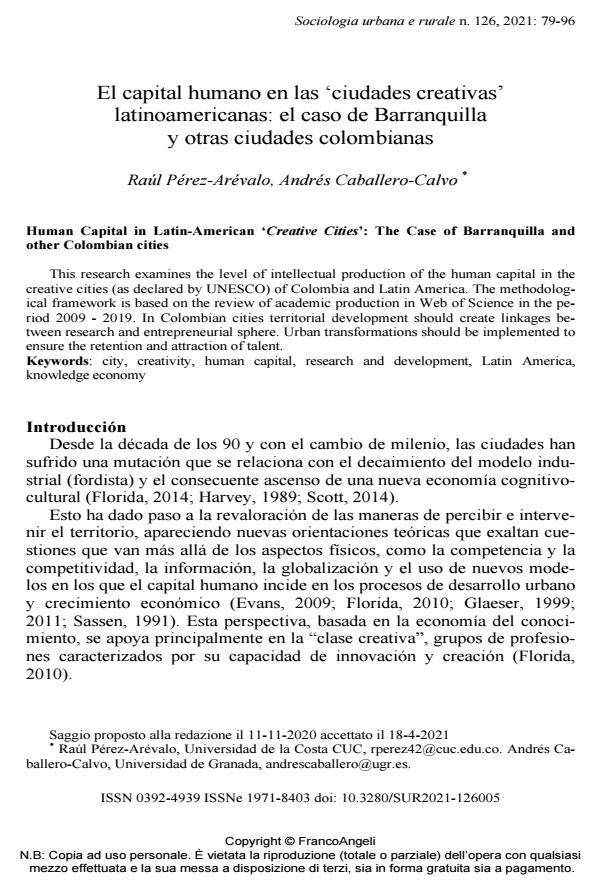Human Capital in Latin-American ‘Creative Cities’: The Case of Barranquilla and other Colombian cities
Journal title SOCIOLOGIA URBANA E RURALE
Author/s Raúl Pérez-Arévalo, Andrés Caballero-Calvo
Publishing Year 2022 Issue 2021/126
Language Spanish Pages 18 P. 79-96 File size 288 KB
DOI 10.3280/SUR2021-126005
DOI is like a bar code for intellectual property: to have more infomation
click here
Below, you can see the article first page
If you want to buy this article in PDF format, you can do it, following the instructions to buy download credits

FrancoAngeli is member of Publishers International Linking Association, Inc (PILA), a not-for-profit association which run the CrossRef service enabling links to and from online scholarly content.
This research examines the level of intellectual production of the human capital in the creative cities (as declared by UNESCO) of Colombia and Latin America. The methodological framework is based on the review of academic production in Web of Science in the period 2009 - 2019. In Colombian cities territorial development should create linkages between research and entrepreneurial sphere. Urban transformations should be implemented to ensure the retention and attraction of talent.
Keywords: city, creativity, human capital, research and development, Latin America, knowledge economy
- Methodological proposal for the inclusion of citizen participation in the management and planning of urban public spaces Juan Jiménez-Caldera, Gren Y. Durango-Severiche, Raúl Pérez-Arévalo, José Luis Serrano-Montes, Jesús Rodrigo-Comino, Andrés Caballero-Calvo, in Cities 105008/2024 pp.105008
DOI: 10.1016/j.cities.2024.105008 - Migraciones de colombianos altamente cualificados: trabajo, identidad y vínculos transnacionales Rita Sobczyk, Andrés Caballero-Calvo, in Revista Colombiana de Sociología /2024 pp.15
DOI: 10.15446/rcs.v47n1.102206
Raúl Pérez-Arévalo, Andrés Caballero-Calvo, El capital humano en las "ciudades creativas" latinoamericanas: el caso de Barranquilla y otras ciudades colombianas in "SOCIOLOGIA URBANA E RURALE" 126/2021, pp 79-96, DOI: 10.3280/SUR2021-126005